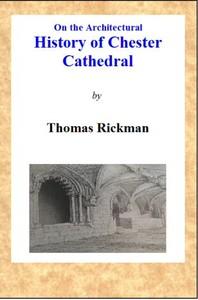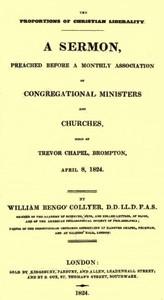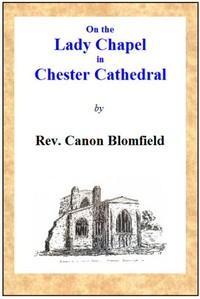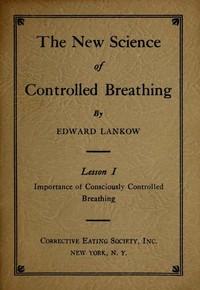Read this ebook for free! No credit card needed, absolutely nothing to pay.
Words: 6652 in 2 pages
This is an ebook sharing website. You can read the uploaded ebooks for free here. No credit cards needed, nothing to pay. If you want to own a digital copy of the ebook, or want to read offline with your favorite ebook-reader, then you can choose to buy and download the ebook.


: On the Architectural History of Chester Cathedral by Rickman Thomas Blomfield George Becher Contributor - Chester Cathedral
BLACKWOOD'S
EDINBURGH MAGAZINE.
FORMS AND BALLADS OF SCHILLER. BY SIR EDWARD LYTTON BULWER.
PART THE LAST.
We here close our attempts to convey to the English reader some notion, however inadequate, of the genius and mind of Schiller. It is in these Poems, rather, perhaps, than in his Dramas and Prose works, that the upright earnestness of the mind, and the rich variety of the genius, are best displayed. Here, certainly, can best be seen that peculiar union of intellect and imagination which Mr Carlyle has so well distinguished as Schiller's characteristic attribute, and in which it would be difficult to name the modern poet by whom he is surpassed; and here the variety of the genius is least restrained and limited by the earnestness of the mind. For Schiller's variety is not that of Shakspeare, a creative and universal spirit, passing with the breath of life into characters the most diverse, and unidentified with the creations its invisible agency invokes. But it is the variety of one in whom the consciousness of his own existence is never laid aside; shown not so much in baring the minds and hearts of others, as in developing the progress and the struggles of his own, in the infinite gradations of joy and of sorrow, of exquisite feeling and solemn thought. Hence, in the drama, arise his faults and deficiencies; in his characters, he himself speaks. They are gigantic images of his own moods at different epochs of his life--impassioned with Moor--philosophizing with Posa--stately, tranquil, and sad, with Wallenstein. But as, in his dramas, this intense perception of self--this earnest, haunting consciousness--this feeling of genius as a burden, and of life as a religion--interferes with true dramatic versatility; so, on the contrary, these qualities give variety in his poems to the expositions of a mind always varying, always growing--always eager to think, and sensitive to feel. And his art loved to luxuriate in all that copious fertility of materials which the industry of a scholar submitted to the mastery of a poet; to turn to divine song whatever had charmed the study or aroused the thought: philosophy, history, the dogma, or the legend, all repose in the memory to bloom in the verse. The surface of knowledge apparent in his poems is immense; and this alone suffices to secure variety in thought. But the aspiring and ardent nature of his intellect made him love to attempt also constant experiments in the theme and in the style. The romantic ballad, the classical tale, the lyric, the didactic, the epigrammatic--the wealth of his music comprehended every note, the boldness of his temper adventured every hazard. Yet still, some favourite ideas take possession of him so forcibly, as to be frequently repeated as important truths. The sacred and majestic office of the poet--the beauty of ideal life, --the worship of Virtue and the Beautiful, for their own sake, and without hope of reward;--these, and many ideas minor to, and proceeding from them, revisit us in a thousand tones of eloquent and haunting music.
E. LYTTON BULWER.
SECOND PERIOD.
And it is peculiarly noticeable, that, whatever Schiller's state of mind upon theological subjects at the time that this hymn was composed, and though all doctrinal stamp and mark be carefully absent from it, it is yet a poem that never could have been written but in a Christian age, in a Christian land--but by a man whose whole soul and heart had been at one time inspired and suffused with that firm belief in God's goodness and His justice--that full assurance of rewards beyond the grave--that exulting and seraphic cheerfulness which associates joy with the Creator--and that animated affection for the Brotherhood of Mankind, which Christianity--and Christianity alone, in its pure, orthodox, gospel form, needing no aid from schoolman or philosopher--taught and teaches. Would, for objects higher than the praise which the ingenuity of labour desires and strives for--would that some faint traces of the splendour which invests the original, could attend the passage of thoughts so noble and so tender, from the verse of a poet to the rhyme of a translator!
HYMN TO JOY.
Spark from the fire that Gods have fed-- JOY--thou Elysian Child divine, Fire-drunk, our airy footsteps tread, O Holy One! thy holy shrine. The heart that Custom from the other Divides, thy charms again unite, And man in man but hails a brother, Wherever rest thy wings of light.
He who this lot from fate can grasp-- Of one true friend the friend to be,-- He who one faithful maid can clasp, Shall hold with us his jubilee; Yes, each who but one single heart In all the earth can claim his own!-- Let him who cannot, stand apart, And weep beyond the pale, alone!
All being drinks the mother-dew Of joy from Nature's holy bosom; And Vice and Worth her steps pursue-- We trace them by the blossom. Hers Love's sweet kiss--the grape's rich treasure, That cheers Life on to Death's abode; Joy in each link--the worm has pleasure, The Cherub has the smile of God!
Free books android app tbrJar TBR JAR Read Free books online gutenberg
More posts by @FreeBooks

: The Proportions of Christian Liberality A sermon preached before a Monthly Association of Congregational Ministers and Churches held at Trevor Chapel Brompton April 8 1824 by Collyer William Bengo - Sermons English 19th century


: On the Lady Chapel in Chester Cathedral by Blomfield George Becher - Chester Cathedral; Lady Chapel (Chester Cathedral); Church architecture England Chester; Sacrament chapels; Chester (England) Antiquities





